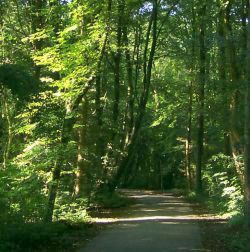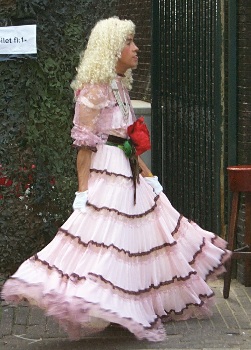The Dutch have a vibrant, diverse economy. Oil, Electronics, Banking, Tourism, Pharmaceuticals, Tulips, Dairy farming and Agriculture are the big industries in Holland. Many of the biggest companies are partially owned by the royal family including Royal Dutch Shell, KLM, and the biggest banks. Unemployment in recent years has been so low it’s staggering, about 2%. The Dutch are desperate for skilled workers especially in high tech fields. Other large Dutch companies include Phillips Electronics, ABN-AMRO Bank, Ahold (food). These are huge multinationals that are presently buying up businesses in other countries including the US. So you might say the Dutch are entering their second ‘Golden Age’.
The Dutch banking system is rather unique. Personal checks are rarely used in Holland. Instead they have a system of Giros which are like a check, except you’re often expected to present it to your own bank to credit someone else’s account at another bank. In other words, only your bank processes your giros. At least that’s how I figure it. Credit card use is minimal since the Dutch don’t like paying interest. Smart cards (debit cards with a chip) have been in use for years. They can be used for phone calls or to get cash from special machines (not ATMs). You can transfer money from your account into the chip, which then dispenses the money or pays for services as you use it. So it’s like having cash, without the currency in your pocket.
In general the Dutch are very secretive about money and won’t discuss their own situation at all. They’ll all talk about everyone else, but themselves. The Dutch currency is perhaps some of the most striking on the planet. Colorful, with great graphics, images, watermarks, metal strips, shiny inks they are virtually irreproducible. Unfortunately, the Euro will be introduced on Jan 1st, 2002, and then all those beautiful colored banknotes will be gone.
The Dutch have a great fondness for money and horde all they can. It’s the national pastime. Getting a Dutchman to part with a guilder can be a difficult task. The only thing worse is trying to do business with them. I’m not sure if it’s a clan mentality, but it’s definitely a by-product of the system of guilds that locked business into the hands of those who “belong”. To an outsider this is daunting, and can be an insurmountable obstacle.
Fortunately the EU has brought about much change at last to the way the Dutch do business. In fact any foreign company can establish itself in any EU country, then do business in all the others without all the hassles of dealing with each government separately. Likewise workers can freely move around the EU and find suitable work and live wherever they choose. Of course you must be a national of an EU country to do this! So you now find an influx of Spanish, French, Italians applying for jobs in Holland. Good thing, as their skills are needed!




 Amsterdam is world famous for its gay scene, and the Dutch tolerance allows it to flourish. In 1998, Amsterdam hosted the Gay Games and the city paid millions of guilders to help sponsor and promote the games. Thousands of people participated in the athletic events and tens of thousands more came for the party! Although it wasn’t successful financially it certainly had a positive impact on the gay community. Warmoesstraat in the Red Light District, Reguliersdwarstraat, and Kerkstraat are popular gay scenes with bars, clubs and cinemas. Straight Dutch often mingle with the gay crowd, since they like a good party too!
Amsterdam is world famous for its gay scene, and the Dutch tolerance allows it to flourish. In 1998, Amsterdam hosted the Gay Games and the city paid millions of guilders to help sponsor and promote the games. Thousands of people participated in the athletic events and tens of thousands more came for the party! Although it wasn’t successful financially it certainly had a positive impact on the gay community. Warmoesstraat in the Red Light District, Reguliersdwarstraat, and Kerkstraat are popular gay scenes with bars, clubs and cinemas. Straight Dutch often mingle with the gay crowd, since they like a good party too! 
